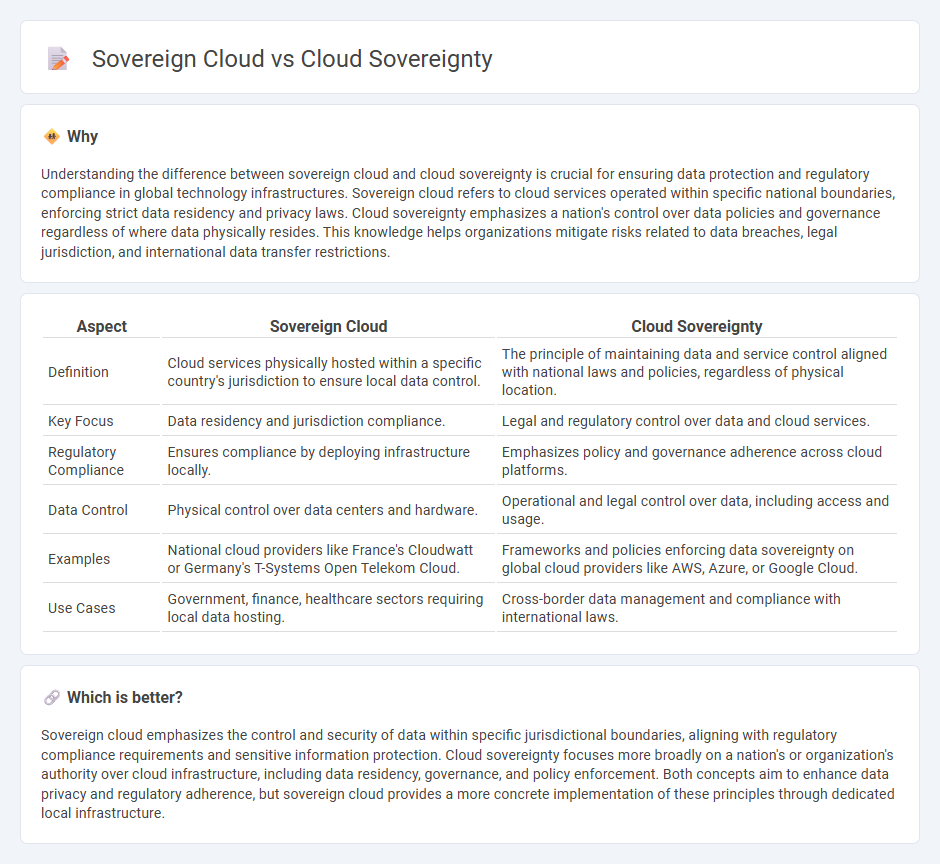
Sovereign cloud emphasizes data residency and control within a specific jurisdiction to comply with local regulations, while cloud sovereignty focuses on the broader concept of ownership and governance over data, including who has access and decision-making authority. Both approaches address data privacy and security, but sovereign cloud is often mandated by national laws, whereas cloud sovereignty centers on organizational policies and autonomy. Explore the key differences and implications of sovereign cloud and cloud sovereignty to enhance your technology strategy.
Why it is important
Understanding the difference between sovereign cloud and cloud sovereignty is crucial for ensuring data protection and regulatory compliance in global technology infrastructures. Sovereign cloud refers to cloud services operated within specific national boundaries, enforcing strict data residency and privacy laws. Cloud sovereignty emphasizes a nation's control over data policies and governance regardless of where data physically resides. This knowledge helps organizations mitigate risks related to data breaches, legal jurisdiction, and international data transfer restrictions.
Comparison Table
| Aspect | Sovereign Cloud | Cloud Sovereignty |
|---|---|---|
| Definition | Cloud services physically hosted within a specific country's jurisdiction to ensure local data control. | The principle of maintaining data and service control aligned with national laws and policies, regardless of physical location. |
| Key Focus | Data residency and jurisdiction compliance. | Legal and regulatory control over data and cloud services. |
| Regulatory Compliance | Ensures compliance by deploying infrastructure locally. | Emphasizes policy and governance adherence across cloud platforms. |
| Data Control | Physical control over data centers and hardware. | Operational and legal control over data, including access and usage. |
| Examples | National cloud providers like France's Cloudwatt or Germany's T-Systems Open Telekom Cloud. | Frameworks and policies enforcing data sovereignty on global cloud providers like AWS, Azure, or Google Cloud. |
| Use Cases | Government, finance, healthcare sectors requiring local data hosting. | Cross-border data management and compliance with international laws. |
Which is better?
Sovereign cloud emphasizes the control and security of data within specific jurisdictional boundaries, aligning with regulatory compliance requirements and sensitive information protection. Cloud sovereignty focuses more broadly on a nation's or organization's authority over cloud infrastructure, including data residency, governance, and policy enforcement. Both concepts aim to enhance data privacy and regulatory adherence, but sovereign cloud provides a more concrete implementation of these principles through dedicated local infrastructure.
Connection
Sovereign cloud ensures data storage and processing comply with specific national regulations, preserving cloud sovereignty by maintaining control over data residency and access. Cloud sovereignty empowers countries and organizations to safeguard sensitive information within their territorial boundaries through tailored cloud services. This connection enhances data security, privacy, and regulatory compliance in the evolving technology landscape.
Key Terms
Data Localization
Cloud sovereignty emphasizes strict compliance with data localization laws, ensuring that data remains within specific national boundaries to protect user privacy and meet regulatory requirements. Sovereign cloud refers to cloud computing services designed and managed within a country's jurisdiction, offering enhanced security controls and governance aligned with local legislation. Explore how these concepts impact data management strategies and regulatory compliance for global businesses.
Jurisdiction
Cloud sovereignty refers to the control and compliance of cloud data within a specific country's legal jurisdiction, ensuring data residency and privacy regulations are met. Sovereign cloud, on the other hand, is a cloud service specifically designed to operate under the laws and policies of one nation, offering enhanced security and regulatory adherence tailored to that jurisdiction. Explore how these concepts impact data governance and secure cloud adoption in regulated industries by learning more about jurisdictional cloud solutions.
Control
Cloud sovereignty emphasizes a nation's legal control over data stored within its borders, ensuring compliance with local regulations and data protection laws. Sovereign cloud refers to cloud services specifically designed and operated under a country's jurisdiction to provide enhanced data sovereignty and security. Explore the key differences and benefits of each approach for comprehensive control over digital assets.
Source and External Links
What is Sovereign Cloud? - Sovereign cloud is a type of cloud computing designed to help organizations comply with regional and national laws by ensuring data sovereignty, operational sovereignty, and digital sovereignty, including control over where data is stored, who accesses it, and maintaining infrastructure resilience.
Microsoft Cloud for Sovereignty capabilities - Microsoft Cloud for Sovereignty offers tools, policies, and technical controls that enable governments and regulated organizations to deploy workloads in the cloud while meeting strict data sovereignty, compliance, and security requirements.
What Is a Sovereign Cloud? Why Is It Important? - A sovereign cloud is a cloud environment that helps organizations meet digital sovereignty standards by protecting personal and sensitive data and adhering to geographic-specific regulations, sometimes operated by cloud providers or as isolated on-premises cloud-like setups.
 dowidth.com
dowidth.com